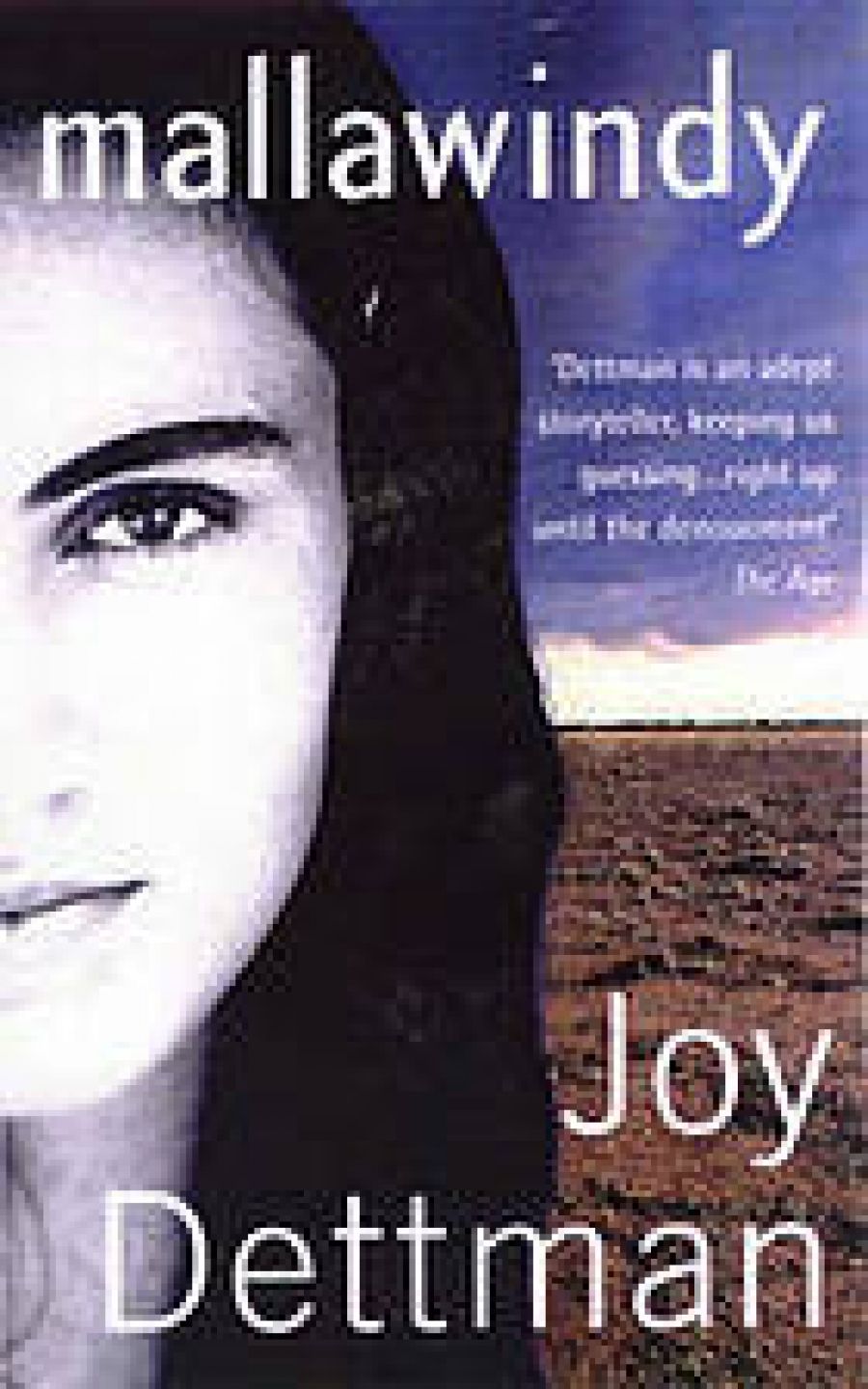
- Free Article: No
- Contents Category: Fiction
- Review Article: Yes
- Online Only: No
- Custom Highlight Text:
If I were inclined to draw connections between books and food, Joy Dettman’s first novel would have to be a hamburger: it’s big, it’s juicy, it’s relatively quick to consume and it’s packed with all the generic trimmings of which a good meaty mystery is made. And while certainly Mallawindy’s characters are thus rather stereotypical and the quality of Dettman’s writing a little clumsy at times, this book is worth sampling if you’re ever so slightly addicted to narratives with gusto. It’s the kind of book you could easily enjoy on the plane, on the tram, or, yes, even on the couch and forget where you were – and this is apt given that one of the primary concerns of this book is not so much food (although a portion of it has made its way into Michael Gifkins’ 1994 extravaganza, Tart and Juicy) as memory loss.
- Book 1 Title: Mallawindy
- Book 1 Biblio: Macmillan, $22.95 pb, 378 pp
- Book 1 Readings Link: booktopia.kh4ffx.net/0JBEbJ
Mallawindy is a small rural town in New South Wales where heat soars, rumours fly, and secrets can be difficult to keep under wraps. It is also the place where Anne Burton is born dead on a river bank the night her enraged and sloshed father, Jack, tries unsuccessfully to burn down the family house. (Jack has just attended his father’s funeral at Narrawee and has learnt that the glorious family mansion has been left to his twin brother, Sam.) When Anne is born her brother, unwilling to leave his baby sister for dead, takes her by the legs, swings her in the air, and miraculously brings her to life. Though ill for some time, Anne gradually becomes healthy enough to leave hospital and begin a life at the property where her parents and siblings live. Here she plays second fiddle to Liza, her slightly older sister whose golden-haired beauty secures her both the Miss Tiny Tot Award and her almost every desire. One day in February 1967, however, when Ellie Burton goes to hospital to have another baby and the handsome Jack is on yet another drinking trip, Sam’s wife, May, who cannot have children of her own, arrives at the house and takes Anne and the spoilt Liza back to Narrawee. When May briefly leaves her house for some bread, Liza, Anne and Ted Crow, the gardener, go missing. Although Anne is ultimately found in the cellar, Liza and Crow are never seen again. Furthermore, what Anne sees that day deprives her of her speech, her hearing (although the book never makes it clear as to the degree to which Anne is deaf – if indeed she is at all) and much of her memory.
Mallawindy is largely interested to explore how Anne gradually remembers the details of Liza’s disappearance. It also narrativises the ways in which that tragedy pervasively inscribes and shapes the reality of Anne’s present life. Anne has nightmares and visions. She writes poems and phrases whose words are not consciously selected and whose meaning she either refuses to negotiate or cannot fathom.
When Anne does recover her voice it is when attempting to botch her beloved teacher’s suicide attempt and it is he, Malcolm Fletcher, who urges her to try to make sense of her muddled thoughts and jottings so as to reveal the mystery of Liza’s disappearance. In words that should have a peculiar – if historiographically naïve – resonance for us, he tells her that ‘until you know your past there can be no real future for you’. Discovering the ‘truth’ about her past, however, is a slow process and its realisation is both enabled and constrained by the other activities that punctuate Anne’s life. She dabbles in dressmaking, falls in love, runs away from home, and gets work in advertising – work that puts her gorgeous dark looks and slender form on TV. Her need to recover the mystery of Liza’s disappearance is also very much a quest for her brother Johnny whose own departure from the house at Mallawindy years ago is, she thinks, tied up with that mystery. Will Anne find Johnny? Who is Ted Crow? What happened to Liza? And is the truth really out there? These questions are what Mallawindy sets out to solve – and does so in a satisfying way. Certainly the book’s over-investment in narrative drive renders some of the writing a little clumsy and long-winded which is a pity because Dettman’s short stories – particularly the award-winning ‘Sea Shells and Bottle Tops’ – prove that she is perfectly capable of crafting language in a wonderfully restrained and intense way. But then, such stories are not mysteries as the meaty Mallawindy is. And if you’re hankering for a good read, you should try it.


Comments powered by CComment